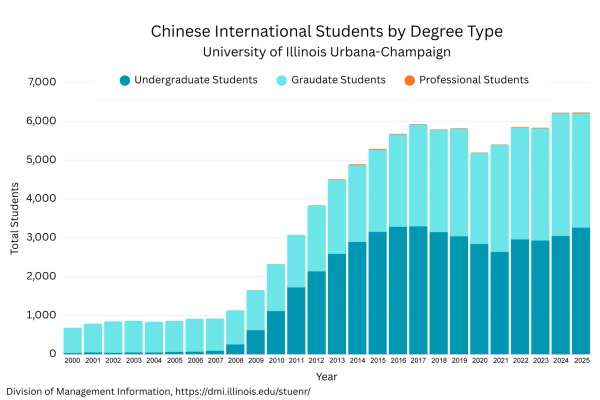Support cultural programming at UIUC
Feb 26, 2008
People often associate the word diversity with affirmative action, but affirmative action is not the topic of this column. Though affirmative action is one way to increase minority enrollment, there are many other ways to attract outstanding prospective underrepresented students. Cultural programming is one of those avenues.
Try to recall when you were choosing a college. Many different characteristics influenced your decision: small, big, private, public, party school or very strict. Most likely, the UI’s social environment was one of the factors that helped you decide to attend this great university. That same dimension is a major factor in minority students’ decisions as well.
Cultural programming makes this school more attractive to minorities. This $2 refundable fee allows student groups and faculty to host culturally inspired events that both teach out-of-group members about that particular culture and help the in-group members appreciate their culture even more.
An event like a Filipino culture-inspired fashion show might convince a visiting prospective Filipino student to attend the University. A prospective black student could make his final determination to attend based on the great experience he had listening to a Civil Rights Movement lecture given during his campus visit.
Obtaining outstanding students of all backgrounds is a priority of the University. The better students we get, the higher rankings and more prestige the University receives and the better the words “Graduate, University of Illinois at Urbana-Champaign” look on your resume. Not only are employers looking for graduates from prominent universities, but they are also looking for students who come from diverse backgrounds.
Get The Daily Illini in your inbox!
Corporations are looking to hire people who have experience with other cultures. As just one example, during the two affirmative action cases filed against the University of Michigan that reached the Supreme Court, 65 different corporations in Michigan contributed to a brief expressing their desire for a diverse work group.
Among the 65 were many household names, including Bank One, Boeing, Intel, Dow Chemical, Procter & Gamble and Coca-Cola. The brief states, “The existence of racial and ethnic diversity in institutions of higher education is vital.”
Skills like being able to facilitate unique, creative approaches to solving problems, working cooperatively with multiple groups, positively contributing to the workforce, and developing products and services that appeal to a variety of consumers and markets are skills the brief states are necessary to succeed in any profession. The reason corporations need to appeal to a variety of consumers is because the population of consumers is steadily growing more diverse.
According to University lecturer Mikhail Lyubansky, who teaches “The Psychology of Race and Ethnicity” and does research on immigration and race relations, the percentage of racial minorities in the total population has increased from about 15 percent in 1960 to more than 25 percent today. According to current population projections, the majority of the U.S. population will be nonwhite by 2050. Lyubanksy said, “I know some people will interpret these statistics negatively, but I see it as a positive development. A diverse population represents a diversity of experiences and ideas, which, in turn, translate to a diversity of skills, talents, artistic expressions and problem-solving abilities. Historically, the United States has a mixed record in this regard, and I think we’re at another important crossroad right now in terms of figuring out precisely what kind of a multicultural and multiracial society we want to have.”
By voting “yes” on cultural programming fee question on the student election ballot, you not only make this campus more appealing to outstanding minority students, but you make yourself more appealing to future employers.
When employers ask, “We are doing a lot of business in China right now, do you have any experience with that culture?” you can confidently say, “Yes, I do, my university has a whole multi-purpose center dedicated to Asian-American culture, where I attended several lectures on the current effects of globalization on the culture and economy of China.” The opportunities and experiences given to you by cultural programming will be worth thousands of times more than the two extra dollars you pay each year.
Paul is a junior in computer and political science and has learned a lot from cultural programming.





